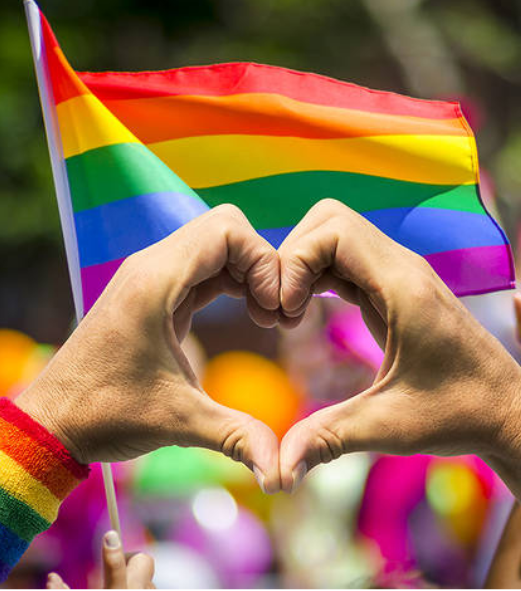Introduction
“Love has no gender – compassion has no religion – character has no race.” – Abhijit Naskar
On October 17, 2023, a Constitutional Bench made up of five Supreme Court judges rejected the idea of legalizing same-sex marriage, sending the issue back to Parliament for further study. The matter described here is whether this demographic has the basic rights while every citizen of the country is entitled to exercise their rights without being discriminated against. Hon’ble Justice Indu Malhotra once said that history owes an apology to these people and their families. Homosexuality is a valid part of the human sexual spectrum. They have the right to dignity and should be free of discrimination. Due to some traditional credence, people have negative perspectives about the community. Traditions and cultures take place where the human mind stands for faith, and this faith also brings out the differences in individual perspectives for the community.
In our times, people have their own justifications for whether to support or oppose an affair that is very ordinary in society. Those justifications also include hatred for the community, which is evident on social media. Sexual orientation forms a core aspect of a person’s identity, the expression of which is a human right. No one should be treated in a biased manner based on their primary identity. Primary identities are those that have the most consistent and enduring impact on our lives, such as race, gender, or nationality. Sexual orientation is the identity of a person, which is a basic human right and a legal identity. The Constitution of India states, in Article 15(1) that the state shall forbid discrimination on grounds of religion, race, caste, gender, or place of birth. The supreme law of the country restricts discrimination against any citizen from being treated in a differential manner, but society still treats the community as inferior. It is well evident that in some places, the people of the LGBTQIA+ community face negative remarks, and as a result, their problems are never questioned or their emotions are never considered.
Advocates argue that denying same-sex couples the right to marry infringes upon their fundamental rights, and legalizing same-sex marriage is a natural extension of constitutional principles. The Special Marriage Act provides a secular framework for marriage that applies to all citizens, irrespective of their religion. However, the Act does not explicitly recognize same-sex marriages, leaving the LGBTQIA+community in legal limbo. A circumstance has arisen in which lawmakers should now consider each sexual orientation while making a law. The National Opinion Research Center (NORC), an American research group at the University of Chicago, conducted a survey from June 9–30, 2020, in which it stated that more than 1 in 3 LGBTQIA+ Americans faced discrimination of some kind in the past year, including more than 3 in 5 transgender Americans. This study discerns that a substantial number of individuals within the LGBTQIA+ community persistently encounter discriminatory practices within their personal lives, at workplaces, and in public domains, as well as impediments in obtaining essential healthcare services. The resultant impact of such discriminatory experiences manifests in adverse consequences for their financial, mental, and physical welfare. LGBTQIA+ Americans have experienced numerous mental health issues related to the COVID-19 pandemic. Concerns regarding the coronavirus compound existing anxieties within this community, particularly impacting those respondents who are most exposed, either due to their health vulnerabilities or frontline employment status.
People are concerned about their personal lives and well-being. Rather, no one is engrossed to be a part of major problems or to support individuals who are in real pain. Even people from the LGBTQ community are mistreated and disowned by their own families. As a community, they are more likely to experience human rights violations, including violence, torture, criminalization, involuntary medical procedures, and discrimination. The Ministry of Social Justice and Empowerment serves as the primary authority for the well-being of transgender individuals. It introduced the Transgender Persons (Protection of Rights) Act in 2019, with its provisions taking effect on January 10, 2020. Additionally, the ministry has formulated “The Transgender Persons (Protection of Rights) Rules, 2020” to facilitate the effective implementation of the Act. These rules were officially published in the Gazette of India on September 29, 2020. With the Transgender Persons Act, the 2019 government was meant to support the community as well as to prohibit any form of discrimination, inequality, or mistreatment faced by transgender persons. Thus, many changes occurred in India, and much assistance encouraged the LGBTQ community in their personal growth and upliftment.
| Same-Sex Union: A Global and Indian Legal Perspective
At present, 35 countries have recognized and legally performed marriage between same-sex couples. The initial legislation granting equal marriage rights to both same-sex and opposite-sex couples was enacted in the continental Netherlands in 2000, officially coming into force on April 1, 2001. Legal recognition has been particularly notable in Western countries, with numerous nations passing legislation to allow same-sex couples to marry. These nations have put forward their concerns for the LGBTQIA+ community, advocating for equal rights and legal recognition of same-sex relationships. As of January 1, 2024, Estonia will officially legalize same-sex marriage.
In some jurisdictions, especially in countries like Saudi Arabia, UAE, Kuwait, etc., the penalty for identifying as a part of the LGBTQIA+ community may amount to severe punishments. In places where being LGBTQIA+ is a crime, the argument is often that same-sex relationships are “unnatural.” In such jurisdictions, the rights of LGBTQIA+ individuals are not recognized as human rights, and the reasoning behind criminalization is often based on the belief that it is “immoral” and “sinful.” In 2013, Nigeria enacted the Same-Sex Marriage (Prohibition) Act to make its stance on not decriminalizing same-sex activity among consenting adults even stronger. Despite the global support from youth through social media, societal behavior towards the community remains unchanged.
Even today, the lingering question is why India has not legalized same-sex marriage. Is it within the purview of Parliament or the responsibility of the apex court? As of today, in India, social media platforms like Instagram, Twitter, and Facebook are used to create pages that represent the LGBTQIA+community. Through the internet, the youth of the nation are active in making people aware of and updated on social issues. After all, people are more engaged in their respective cultures and religious teachings; some have a positive approach and some have disagreements. In the 21st century, people have started thinking more practically, and as a result, the LGBTQIA+ community has scope for jobs, education, etc. Hence, the basic factor of independence has occurred in their lives.
There is a landmark Indian case that was heard at the Delhi High Court on section 377 of the Indian Penal Code 1860.
Section 377 of IPC, 1860
Unnatural offences: Whoever voluntarily has carnal intercourse against the order of nature with any man, woman or animal, shall be punished with imprisonment for life, or with imprisonment of either description for a term which may extend to ten years, and shall also be liable to fine.
| Naz Foundation v. Govt. of NCT of Delhi
In 2001, Naz Foundation, a non-governmental organization working in the field of HIV/AIDS intervention and prevention, filed a writ petition in the Delhi High Court. The primary allegation was Section 377 of IPC which criminalized certain forms of sexual intercourse other than heterosexual penile-vaginal intercourse. The foundation aimed to highlight these negative consequences and advocate for the decriminalization of consensual same-sex relationships.
In 2003, the Delhi High Court declined to review the petition, stating that the petitioners lacked locus standi in the matter. The Foundation then approached the Supreme Court through an appeal against the decision of the Delhi High Court. The Supreme Court of India acknowledged the validity of the petition and directed its reconsideration on its merits by the Delhi High Court.
Finally, in 2009, the two-judge bench of the Delhi High Court ruled that considering consensual homosexual sex between adults as a crime is a violation of fundamental rights as per the Constitution of India. Hence, the verdict emphasized that adult consensual same-sex relationships were no longer illegal.
| Evolution of LGBTQ Rights in India: A Journey through Historical Decisions
The Naz Foundation case marked a significant step towards the recognition of LGBTQIA+community rights in India. However, the issue of legalizing same-sex marriage remained unsolved. Although the decriminalization of consenting same-sex relationships was a significant step forward, there is still work to be done to achieve complete legal equality and recognition, including the ability to marry. The fight for same-sex marriage highlights the efforts made to provide the LGBTQIA+population in India with more legal recognition and equal rights.
The Supreme Court of India ruled in National Legal Services Authority v. Union of India (NALSA v. UOI) on April 15, 2014, recognizing the rights of transgender individuals in India and establishing several safeguards for their rights, including welfare policy creation, the outlawing of discrimination, and setting asides for transgender individuals in employment and educational institutions.
The goal of the Transgender Persons (Protection of Rights) Act, 2019 is to safeguard transgender people’s rights, welfare, and other relevant issues. Following the expiration of the Transgender Persons (Protection of Rights) Bill 2018, the Act was introduced in the Lok Sabha, the lower house of parliament, on July 19, 2019 by Thaawarchand Gehlot, the minister of social justice and empowerment. There was a 2016 version before both the 2019 legislation and the 2018 bill that came just after it. Some Indian activists, attorneys, and transgender people responded to them with criticism and protests.
| Conclusion
It’s critical to keep in mind the words of pioneering LGBTQIA+ activist Harvey Milk as we commemorate this milestone: “Hope will never be silent.” The pursuit of justice, hope, and tenacity must be the driving forces behind the continued struggle for equal rights. The fight for same-sex marriage is a celebration of love in all its forms and a cry for societal change in addition to being a legal war. However, there is a vacuum in our quest for full equality that is highlighted by the lack of legal provisions for same-sex marriage.
It is important to keep in mind the words of Bayard Rustin, a gay man who lived in an era when it was illegal for him to be gay and a major player in the American civil rights movement, as we work through the complexity of this problem. Rustin once stated, “When an individual is protesting society’s refusal to acknowledge his dignity as a human being, his very act of protest confers dignity on him.” The LGBTQIA+ community and its allies are fighting for marriage equality and affirming that every person, regardless of sexual orientation, has intrinsic dignity and humanity.
A basic truth is at the core of the issue: everyone should have the freedom to love and get married, as this reflects the universal nature of human connection.
By Sherin Shaji, 2nd Year B.A. LL.B (Hons.), Faculty of Law, The Maharaja Sayajirao University of Baroda, Vadodara

